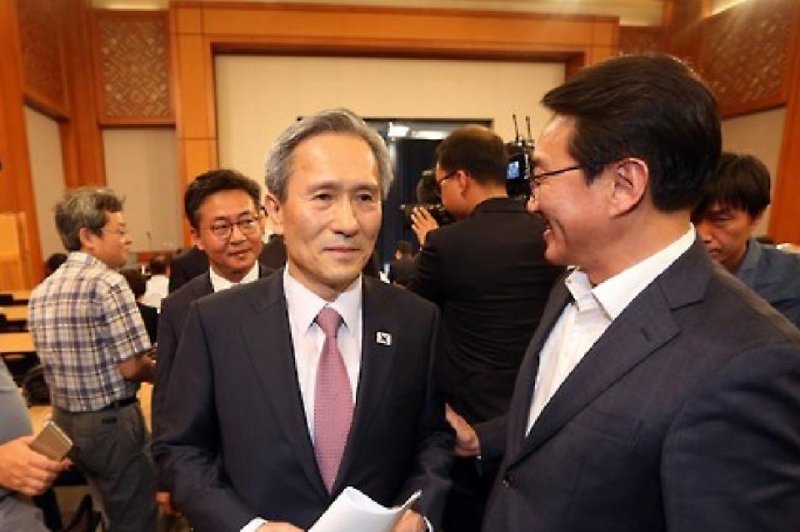South Korea's National Security Adviser Kim Kwan-jin on early Tuesday after delivering a statement on the agreement between Seoul and Pyongyang at the presidential Blue House in Seoul, South Korea. Kim said Seoul hoped to start a new chapter in inter-Korea relations by forming a “trust through cooperation." Photo by Yonhap
SEOUL, Aug. 24 (UPI) -- South Korea's National Security Adviser Kim Kwan-jin said numerous challenges had to be overcome during four days of tough negotiations with North Korea, but patience and adherence to principle eventually led to a landmark agreement to end recent tensions.
Seoul and Pyongyang reached a deal early Tuesday after midnight when North Korea agreed to express "regret" over the land mine explosions that critically injured two South Korean soldiers – and Seoul in return agreed to stop loudspeaker broadcasts across the demilitarized zone.
"As long as no unusual events take place, we believe it is possible to achieve multiple goals," Kim said, according to South Korean newspaper Donga Ilbo.
Kim said in a statement delivered at 2 a.m. at the presidential Blue House that Pyongyang expressed regret over the South Korean soldiers who suffered injuries during the land mine blasts, and that Seoul agreed to suspend all broadcasts along the front line starting Tuesday at 12 p.m., local time.
North Korea also said it has agreed to remove its declaration of a "quasi-state of war" announced last Friday, and both sides agreed to resume an active level of civic exchange, beginning with North-South family reunions on Sept. 27, an annual holiday in the two Koreas known as Chuseok.
The South Korean official said Seoul hoped to start a new chapter in inter-Korea relations by forming a "trust through cooperation," but also pointed out the North's promise to put an end to its provocations came about due to an adherence to principle, and Seoul's refusal to meet North Korean demands until its requirements were met.
The turning point in the long, tense negotiations took place against the backdrop of increased buildup at the front lines, but South Korean news agency Yonhap reported Seoul's military intelligence had detected a drop in the fleet of North Korean submarines that had been dispatched from their bases.
One unidentified South Korean military official told Yonhap on Tuesday that 70 percent, or 50 of the 77 submarines North Korea had deployed from bases on Aug. 21 were no longer appearing on surveillance equipment. But as tensions subside, Seoul said it plans to continue anti-submarine patrol activities at the Northern Limit Line on the western coast.
North Korean submarines can stay submerged for three days before they return to the surface to replenish the vessel's oxygen supply.
South Korea said North Korea's fleet of submarines includes the 1,800-ton Romeo class submarine, the 325-ton Shark class, the 130-ton Salmon class and the new Shinpo-class submarine weighing at 2,000 tons.















